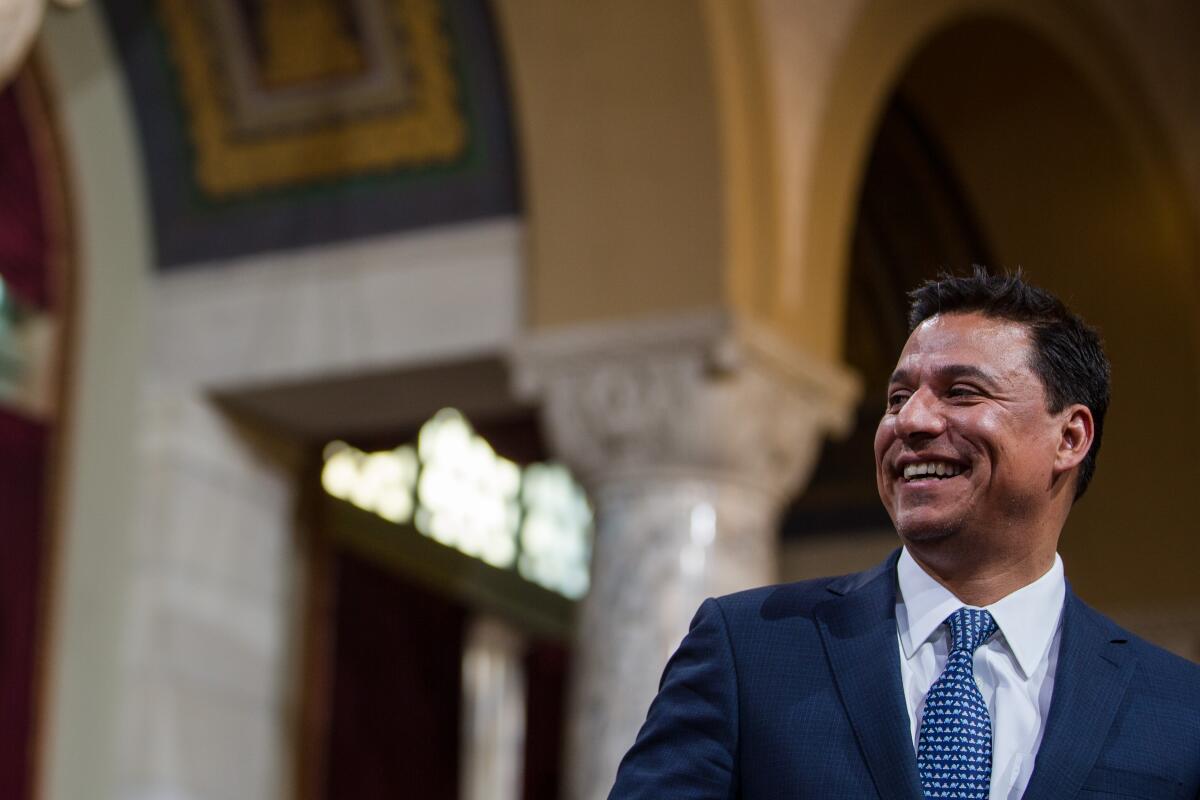Op-Ed: How Jose Huizar’s alleged crimes may have been aided by redistricting

In 2012, when City Council district lines were last redrawn, we wondered why both of our South Los Angeles districts were unnecessarily gutted. We’re still wondering, but since the arrest of suspended council member Jose Huizar, for allegedly using his office to line his pockets, our musings have taken a more sinister turn.
The redistricting process has a simple goal: to ensure that each council district has about the same number of residents. After each census, there is some rebalancing to even things out. But the way it was done in 2012 was, as this newspaper put it, “the result of backroom deals,” that were “used to punish enemies and reward friends and supporters” of then-Council president Herb Wesson and his allies.
Among the biggest recipient of those rewards was Huizar, the man Wesson handpicked to chair the powerful Planning and Land Use Committee and someone he has described as “like my brother” and “my best friend on the council.” In the shuffling of districts, Huizar ended up with a large swath of asset-rich downtown, a good thing if you’re trying to rack up campaign contributions — or alleged bribes.
At the time, we represented the 8th and 9th districts, in South Los Angeles. And, although our two economically challenged, minority areas could least afford it, we were on the losing end of redistricting. Neither of us had supported Wesson’s bid to become council president, and we both lost key chunks of our districts during redistricting. Los Angeles, though, looks to be the biggest loser of all, especially if Huizar is convicted of the crimes with which he is charged. Wesson has not been charged with any crime or implicated in the scandal.
You don’t have to look far to see how the redistricting process figures into the corruption charges. Giving Huizar the keys to downtown meant his district was filled with high-priced development projects — and wealthier targets to hit up for campaign cash and, if federal prosecutors are right, luxury trips, lavish meals, expensive suits and hundreds of thousands of dollars in cash. The land underneath the development projects for which he allegedly received bribes was added to his district in the 2012 redistricting.
Many of our former colleagues in City Hall have developed selective amnesia about that process and don’t acknowledge how it contributed to the situation we find ourselves in today. But, we would remind them of this: The lines that were redrawn that year to give Huizar his new district were not legally required by the census. And, based on population growth, our districts would only have needed minor alterations to the boundary lines.
Next year, the city will begin the process of redrawing council districts once again. How a line is moved can make it easier or harder for a council member to keep a district in the next election. It can make it easier or harder to raise campaign funds. Those facts make it all the more imperative that we follow the advice this newspaper gave in 2012: The city “must not retain the corrupt status-quo process for redistricting.”
In 2012, the City Council employed a process in which it retained control, but not accountability. Rather than drawing the lines itself or handing over responsibility to an independent commission, as the state does, the council created a commission that appeared to be at an arm’s length but wasn’t. Each council member, as well as other city officials, could appoint a commissioner — and remove that commissioner at will — so the body had no real independence. And a Wesson staffer became the commission’s director. Wesson was ultimately able to get the lines drawn the way he wanted them.
Going forward, we need a much more independent process with clearly drawn goals and objectives and much more community input. We need to ensure transparency and allow public testimony without undue political influence, while following federal laws, like One Person, One Vote. We also need accountability.
It is also time to consider other things that would keep the City Council more accountable, including a yearly rotation of the presidency among the sitting members and a defusing of the power of committee chairs, especially those on committees such as the Planning and Land Use Committee, which provides opportunities for self-dealing, since it makes decisions that can harm or benefit powerful special interests.
Corruption in the city isn’t just something abstract. It’s real, and it has to be fought every day.
Bernard Parks is a former member of the Los Angeles City Council and former chief of the Los Angeles Police Department. Jan Perry is a former member of the Los Angeles City Council and former general manager of the city’s Economic & Workforce Development Department.
More to Read
A cure for the common opinion
Get thought-provoking perspectives with our weekly newsletter.
You may occasionally receive promotional content from the Los Angeles Times.










